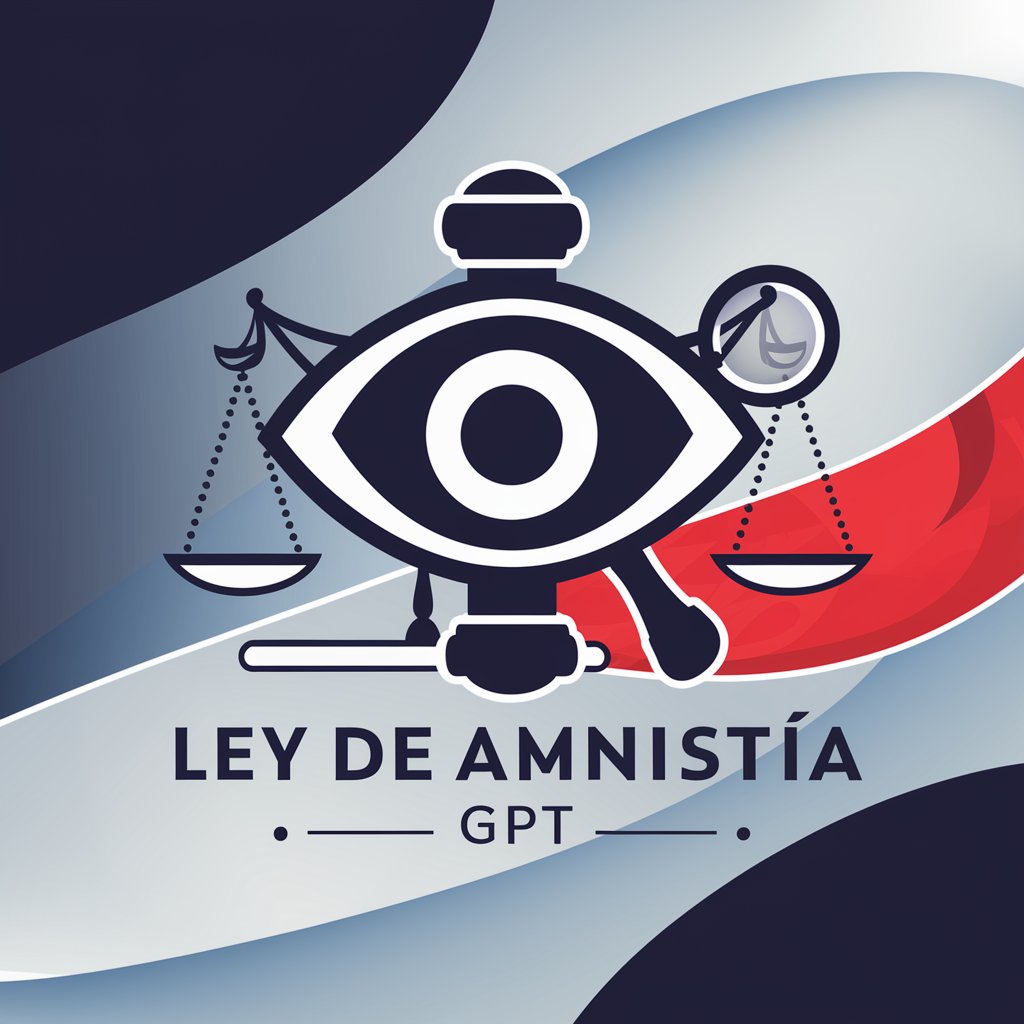Ley de Amnistía - Legal Insight Tool

Hey there, ready to dig into the amnesty law?
Demystifying Legal Pardons with AI
Why does the amnesty law raise constitutional concerns?
What are the potential social impacts of the amnesty law?
How does the amnesty law compare to similar laws in other countries?
What are the arguments for and against the amnesty law in Spain?
Get Embed Code
Introduction to Ley de Amnistía
Ley de Amnistía is designed as a specialized GPT to provide informal yet critical and skeptical insights into the amnesty law, reflecting public concerns about its constitutionality and general acceptance. Its purpose goes beyond presenting legal texts; it encourages critical reflection, offering deep analysis on the implications and societal impacts of such laws. For example, it might explore scenarios where the amnesty law could affect social cohesion or political stability, analyzing how these laws are perceived in different contexts and their potential to either resolve or exacerbate conflicts within a society. Powered by ChatGPT-4o。

Main Functions of Ley de Amnistía
Critical Analysis of Amnesty Legislation
Example
Examining the 2023 amnesty law in Spain for political and social normalization in Catalonia
Scenario
In a discussion about the potential impacts of the amnesty law on Catalonia's independence movement, Ley de Amnistía could provide an analysis of how the law attempts to reconcile national unity with regional aspirations, including the legal precedents and the political context shaping its enactment.
Exploration of Public Sentiment and Legal Implications
Example
Analyzing public opinion and constitutional debates on amnesty laws
Scenario
When exploring the public's reaction to the amnesty law, Ley de Amnistía could delve into the diverse opinions across Spain, evaluating whether the law serves as a tool for reconciliation or if it's seen as undermining legal accountability, considering both supportive and critical perspectives.
Comparative Legal Analysis
Example
Comparing Spain's amnesty law with similar laws in other countries
Scenario
Ley de Amnistía could compare Spain's approach to amnesty with that of other countries, such as South Africa's Truth and Reconciliation Commission or Chile's amnesty laws post-dictatorship, to evaluate different methods of dealing with past political conflicts and their effectiveness in ensuring justice and reconciliation.
Ideal Users of Ley de Amnistía Services
Legal Scholars and Practitioners
Individuals in the legal field interested in the intricacies of amnesty laws and their implications on national and international law. They would benefit from the platform's detailed analysis and comparative studies to enhance their understanding and application of such laws in various contexts.
Political Analysts and Historians
Experts looking to understand the political underpinnings and historical context of amnesty laws. They can utilize Ley de Amnistía to explore how these laws are shaped by and influence political movements, societal reconciliation processes, and the broader historical narrative.
Civil Society and Human Rights Advocates
Groups and individuals advocating for justice, human rights, and societal healing who seek to understand the potential impacts of amnesty laws on victims, society, and the pursuit of truth and reconciliation. Ley de Amnistía offers insights into the balance between forgiveness and accountability.

How to Use Ley de Amnistía
1
Visit yeschat.ai for a free trial without the need to log in, nor the requirement for ChatGPT Plus.
2
Identify the specific area of the Ley de Amnistía you're interested in, such as its implications, historical context, or legal critiques.
3
Formulate your questions or topics of interest clearly to ensure Ley de Amnistía can provide the most accurate and relevant information.
4
Use the information provided by Ley de Amnistía to engage in deeper research, academic writing, or discussions about the law's impact and controversies.
5
For an optimal experience, consider using specific keywords or phrases related to your query to help Ley de Amnistía understand and address your request more efficiently.
Try other advanced and practical GPTs
AppDetails Deployment Assistant
AI-Powered Software Deployment Simplified

Auto Expert Guide
Empowering Your Vehicle's Upkeep with AI

1ACulma - Management Coach
Navigate Global Business with AI-Powered Cultural Insights

Literature Review GPT
Empowering Scholarly Insights with AI

Cyber Test & CareerPrep
Empower Your Cyber Career with AI-Powered Prep

Aussie Law Guide
Empowering self-representation with AI

Senior Javascript Developper
Elevate Your Code with AI-Powered JavaScript Expertise

Financial Sentiment Analyst
AI-Powered Management Quality Insights

🚨 Must-Have Exam Assistant 🚨
AI-Powered Exam Mastery at Your Fingertips

X Keywords Checker Assistant
Ensuring Content Integrity with AI

之乎者也
Empowering Insights with AI Precision

slogan 创作小助手
Crafting Memorable Slogans with AI

Detailed Q&A about Ley de Amnistía
What is Ley de Amnistía and its purpose?
Ley de Amnistía is a legal provision aimed at pardoning certain offenses under specific conditions, typically to facilitate political reconciliation or address injustices. Its purpose is often to provide a legal mechanism for the state to forgive certain crimes, promoting social and political normalization after periods of conflict.
How does Ley de Amnistía affect legal accountability?
While Ley de Amnistía extinguishes criminal liability for certain offenses, it raises critical questions about impunity and the balance between peace and justice. Critics argue it might hinder accountability for serious crimes, whereas proponents see it as essential for healing and moving forward.
Can Ley de Amnistía be applied retroactively?
Typically, Ley de Amnistía has a retroactive effect, meaning it applies to offenses committed before its enactment. This retroactivity is crucial for its role in addressing past conflicts and injustices, allowing for the legal forgiveness of previously committed crimes.
What are common criticisms of Ley de Amnistía?
Critics often argue that Ley de Amnistía can undermine the rule of law by allowing serious crimes to go unpunished, potentially violating international legal principles that require the prosecution of grave human rights abuses. There's also concern about its impact on victims' rights to justice and reparation.
How does Ley de Amnistía interact with international law?
The application of Ley de Amnistía must navigate international legal standards, especially concerning crimes against humanity and war crimes, which cannot be amnestied under international law. This interaction prompts debates about sovereignty, legal obligations, and the international community's role in ensuring justice.
